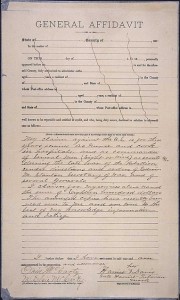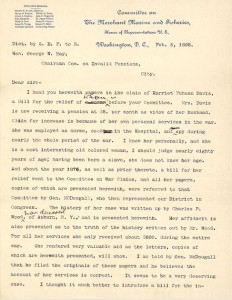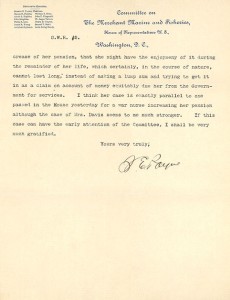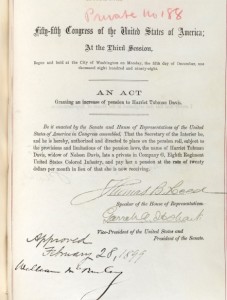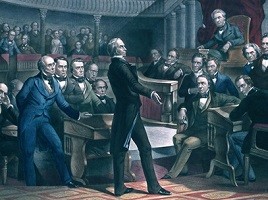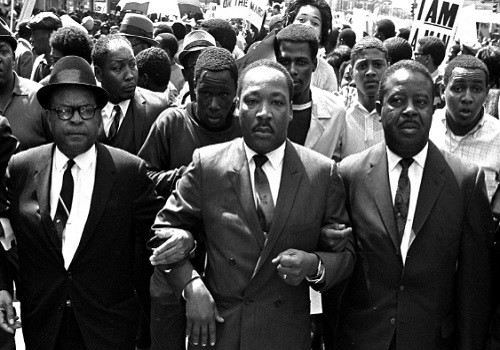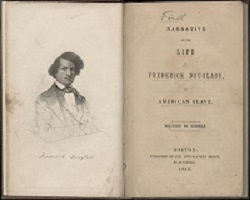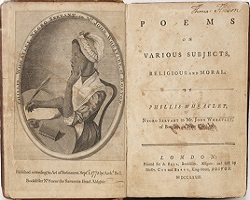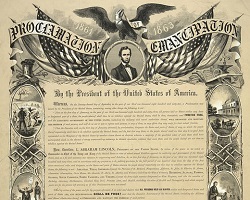Compensation for Civil War Services
In the summer of 1865 Harriet Tubman returned home to Auburn, New York from Virginia where she was serving in a hospital near Fort Monroe. Without a steady income it was difficult for Tubman to make ends meet, she was in charge of her elderly parents and constantly providing for those looking for refuge in her home. Tubman sought compensation for her services during the Civil War which turned into a 34 year ordeal. Because her services as a nurse, cook, spy and scout were not documented compensation was hard to get. All Tubman had received was $200 for 3 years of service.
In 1865 she appealed to the federal government for the first time and then a second time in 1867. Influential friends and community leaders published letters in newspapers advocating for Tubman’s case, she deserved a veteran’s pension.
An Auburn banker named Charles P. Wood prepared a detailed account and documentation of Tubman’s war service and military assignments. It was given to Congress but it lacked official documents. This document took years to make it to the top decision maker. In 1874 New York Congressman, Mc Dougall, pressed the issue in Congress. Tubman’s bill H.R. 2711 for $2000 passed the House but was struck at the Senate for lack of documentation.
In 1890, two years after her second husband, Nelson Davis, died a law was passed under which Tubman was eligible to receive a war veteran widow’s pension of $8 a month. Nelson Davis served as Private Nelson Charles in Company G, Eighth United States Colored Infantry from September 25, 1863 to November 10, 1865. For the first time in her life Harriet Tubman had a steady and reliable income. However the application for her services in the civil war was struck in the bureaucracy pipeline.
In 1898, several of her close friends such as Onim and Elsie McCarty, Sereno Payne, General McDougall and Secretary of State under President Lincoln, William Henry Seward, pursued Tubman’s application for a veteran’s pension. Tubman was already 78 years old and living in undeserved poverty.
Final effort to get compensation- Bill HR4982
An affidavit signed by Onim McCarthy and Elsie McCarty on behalf of Harriet Tubman claiming a pension for her services as nurse and cook and as commander of several men as scouts during the Civil War. The affidavit stated that she was under the command of Edwin M. Stanton, Secretary of War, and several Generals. A compensation for $1,800 was requested.
An affidavit claiming that Tubman had served in the Civil War and claiming compensation. Click on image to enlarge. Source: U.S. National Archives and Records Administration.
On February 1898 Sereno Payne, the Chairman of the Committee on Merchant Marine and Fisheries, wrote a letter to George Ray, the Chairman of the Committee on Invalid Pensions, on behalf of Harriet Tubman. In the letter he testified that she was employed as a nurse, cook and spy. The purpose of the letter was to propose an increase to the $8 pension she was receiving as a widow instead of the previous bill HR2711 that requested a lump sum payment of $1,800. It acknowledged the previous bill that included all original documentation and presented to the Committee on War Claims by General McDougall.
Letter from Sereno Payne to George Ray. Click on image to enlarge. Source: U.S. National Archives and Records Administration.
On January 19, 1899 bill HR4982 proposed an increase of her current pension to $25 a month for her services as a nurse in the U.S. Army.
On February 7, 1899 the Senate Report in response to Bill HR4982 determined that the Committee of Pensions objected the increase to $25. While acknowledging her service and dedication to the country as a nurse, it argued that the number of nurses on the pension roll at a rate higher than $12 a month is very few and that there are no valid reasons why Tubman should receive a pension of $25 a month which would open pension increases. The Committee of Pensions instead decided that her widow pension would be increased to $20 a month in consideration of her personal services to the country.
The Act was approved by Congress on February 28, 1899 and read:
Be it enacted by the Senate and House of Representatives of the United States of America in Congress assembled, that the Secretary of Interior be authorized and directed to place on the pension roll, subject to the provisions and limitations of the pension laws, the name of Harriet Tubman Davis, widow of Nelson Davis, late private in Company G, Eighth United States Colored Infantry and pay her a pension at the rate of twenty dollars per month in lieu of what she is now receiving.
Act 4982 provides Harriet Tubman with a $20 a month widow pension for the rest of her life. Click on image to enlarge. Source: U.S. National Archives and Records Administration
Unfortunately the Act does not acknowledge her services in the Civil War and even decreases the amount recommended by the Senate. In February 1899, when Tubman was 79 years old and 34 years after her first application, a widow’s pension was granted to Tubman for the sum of $240 per year.
Category: Civil War
